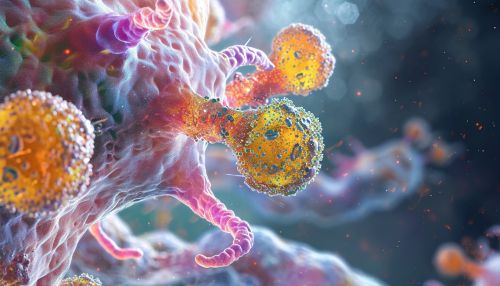Cytokine receptor
Introduction
A Cytokine receptor is a type of protein found on the surface of cells that interacts with cytokines. Cytokines are small proteins that are crucial for cell signaling, and their receptors play a critical role in the body's immune response and cell growth. Cytokine receptors belong to the larger class of proteins known as cell surface receptors, which are responsible for transmitting signals from the cell's exterior to its interior.
Structure
Cytokine receptors are typically composed of multiple subunits, which can either be identical (homodimeric) or different (heterodimeric). These subunits are usually linked together by disulfide bonds. Each subunit has an extracellular domain that binds to the cytokine, a transmembrane domain that spans the cell membrane, and an intracellular domain that transmits the signal into the cell.


Classification
Cytokine receptors can be classified into several different families based on their structural characteristics. These include the immunoglobulin superfamily, the class I cytokine receptor family, the class II cytokine receptor family, the tumor necrosis factor receptor family, and the chemokine receptor family.
Function
The primary function of cytokine receptors is to bind to cytokines and transmit their signals into the cell. This process, known as signal transduction, is critical for a variety of cellular processes, including cell growth, differentiation, and immune response. When a cytokine binds to its receptor, it triggers a cascade of intracellular events that ultimately leads to a change in the cell's behavior.
Signal Transduction
Cytokine receptors transmit signals through a process known as signal transduction. This process begins when a cytokine binds to the extracellular domain of the receptor. This binding event triggers a conformational change in the receptor, which allows it to interact with intracellular signaling proteins. These proteins then activate a series of other proteins in a cascade-like manner, ultimately leading to changes in gene expression within the cell.
Clinical Significance
Cytokine receptors are of significant clinical interest due to their role in immune response and cell growth. Abnormalities in cytokine receptor function can lead to a variety of diseases, including autoimmune diseases, cancers, and infectious diseases. As such, cytokine receptors are often targets for therapeutic intervention. Drugs that target cytokine receptors can either enhance or inhibit their function, depending on the disease being treated.
